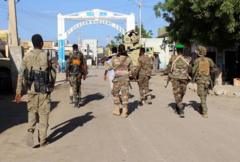The ongoing diplomatic tensions suggest potential pathways to peace or escalation, as both sides prepare for indirect talks.
**Iran Seeks Nuclear Deal, Demands Halt to US Military Threats**

**Iran Seeks Nuclear Deal, Demands Halt to US Military Threats**
Iran's Foreign Minister insists on a nuclear agreement contingent upon a cessation of US military coercion.
In a significant turn of events, Iran has expressed its readiness to negotiate a nuclear agreement with the United States, provided that military threats from Washington cease. Foreign Minister Abbas Araghchi emphasized that for successful talks, President Donald Trump must acknowledge that there is no viable "military option" in addressing Iran's nuclear ambitions. This announcement comes ahead of indirect talks scheduled for Saturday in Oman, contradicting Trump's earlier claims of direct negotiations.
Iran's position is clear: unless the US commits to non-coercion, it cannot expect compliance. During a recent opinion piece, Araghchi reaffirmed Iran's intentions to engage sincerely, remarking on the importance of mutual respect during the negotiations. The Foreign Minister noted that Iran has always maintained that its nuclear endeavors are strictly for peaceful purposes and firmly rejects any assertions of pursuing nuclear weapons.
President Trump has previously acknowledged that failure to reach an agreement would leave Iran in "great danger," underscoring the potential consequences if negotiations falter. Amidst these tensions, the United States has indicated a desire for "full dismantlement" of Iran's nuclear program, a demand that Iran's officials have firmly rejected.
In a meeting with Israeli Prime Minister Benjamin Netanyahu, both leaders shared concerns over a potential nuclear-capable Iran. Netanyahu has insisted on a stringent approach comparable to the dismantlement of Libya's weapons programs, an outcome Iran's officials have made clear they are unwilling to accept.
The backdrop to this diplomatic dialogue is fraught with mistrust, particularly following Trump's 2018 withdrawal from the Joint Comprehensive Plan of Action, commonly known as the Iran nuclear deal. This move prompted Iran to breach several restrictions imposed by the agreement in response to renewed sanctions.
As Iran heads into what could be a pivotal moment in US-Iran relations, the implications of these talks could resonate beyond their immediate outcomes, influencing international relations and the geopolitical landscape in the Middle East. The world watches closely as both sides prepare to engage in high-stakes deliberations, with extensive focus on each party's willingness to compromise and uphold diplomatic integrity.
Iran's position is clear: unless the US commits to non-coercion, it cannot expect compliance. During a recent opinion piece, Araghchi reaffirmed Iran's intentions to engage sincerely, remarking on the importance of mutual respect during the negotiations. The Foreign Minister noted that Iran has always maintained that its nuclear endeavors are strictly for peaceful purposes and firmly rejects any assertions of pursuing nuclear weapons.
President Trump has previously acknowledged that failure to reach an agreement would leave Iran in "great danger," underscoring the potential consequences if negotiations falter. Amidst these tensions, the United States has indicated a desire for "full dismantlement" of Iran's nuclear program, a demand that Iran's officials have firmly rejected.
In a meeting with Israeli Prime Minister Benjamin Netanyahu, both leaders shared concerns over a potential nuclear-capable Iran. Netanyahu has insisted on a stringent approach comparable to the dismantlement of Libya's weapons programs, an outcome Iran's officials have made clear they are unwilling to accept.
The backdrop to this diplomatic dialogue is fraught with mistrust, particularly following Trump's 2018 withdrawal from the Joint Comprehensive Plan of Action, commonly known as the Iran nuclear deal. This move prompted Iran to breach several restrictions imposed by the agreement in response to renewed sanctions.
As Iran heads into what could be a pivotal moment in US-Iran relations, the implications of these talks could resonate beyond their immediate outcomes, influencing international relations and the geopolitical landscape in the Middle East. The world watches closely as both sides prepare to engage in high-stakes deliberations, with extensive focus on each party's willingness to compromise and uphold diplomatic integrity.





















